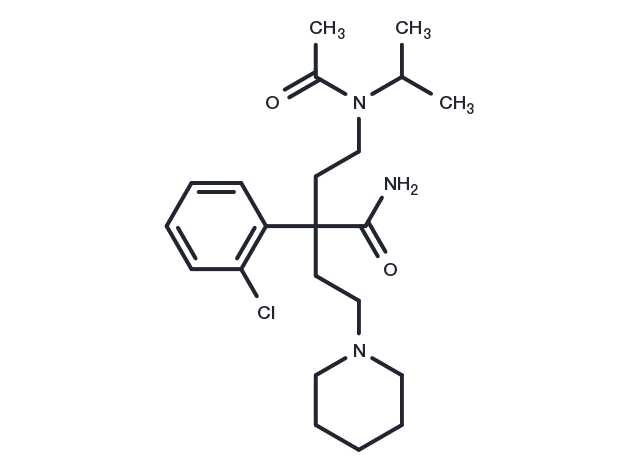Powder: -20°C for 3 years | In solvent: -80°C for 1 year


Bidisomide (SC40230) is an agent of class I antiarrhythmic.

| Pack Size | Availability | Price/USD | Quantity |
|---|---|---|---|
| 1 mg | In stock | $ 193.00 | |
| 5 mg | In stock | $ 488.00 | |
| 10 mg | In stock | $ 716.00 | |
| 25 mg | In stock | $ 1,120.00 | |
| 50 mg | In stock | $ 1,480.00 | |
| 100 mg | In stock | $ 1,980.00 | |
| 500 mg | In stock | $ 3,970.00 | |
| 1 mL * 10 mM (in DMSO) | In stock | $ 538.00 |

| Description | Bidisomide (SC40230) is an agent of class I antiarrhythmic. |
| In vivo | Bidisomide's anti-arrhythmia effects. Bidisomide (5 mg/kg) reduces the number of premature ventricular complexes and the incidence of ventricular tachycardia and ventricular fibrillation similarly to Mexiletine (MXT) and Disopyramide (DSP) in rats with ventricular arrhythmias induced by coronary artery occlusion. After 5 minutes of coronary artery occlusion, the antiarrhythmic effect of 5 mg/kg Bidisomide was similar to the same dose of MXT and DSP in rats with ventricular arrhythmias caused by coronary reperfusion. All three drugs significantly slow the heart rate[1]. |
| Synonyms | SC40230 |
| Molecular Weight | 407.98 |
| Formula | C22H34ClN3O2 |
| CAS No. | 116078-65-0 |
Powder: -20°C for 3 years | In solvent: -80°C for 1 year
DMSO: 225.0 mg/mL (551.5 mM), Sonication is recommended.
You can also refer to dose conversion for different animals. More
bottom
Please see Inhibitor Handling Instructions for more frequently ask questions. Topics include: how to prepare stock solutions, how to store products, and cautions on cell-based assays & animal experiments, etc.
Bidisomide 116078-65-0 Others SC 40230 SC-40230 SC40230 inhibitor inhibit
